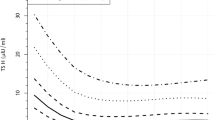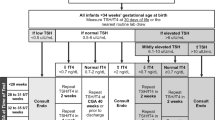Abstract
Objective and setting:
The national neonatal thyrotropin (TSH) screening data for 2000–2002 were analysed to assess the extent and severity of iodine deficiency in Latvia.
Results:
Elevated newborn TSH (>5 mIU/l) decreased from 16.5 to 10.4% and 8.4% in 2000, 2001 and 2002, respectively. For each year and in all regions, the prevalence of elevated newborn TSH was above the cut-off level indicative for a public health problem. A positive correlation (r=0.82, P<0.05) existed between elevated newborn TSH and low urinary iodine excretion among a nationwide sample of school children in 2000.
Conclusion:
Latvia is iodine deficient, putting each new generation at risk of preventable brain damage.
This is a preview of subscription content, access via your institution
Access options
Subscribe to this journal
Receive 12 print issues and online access
$259.00 per year
only $21.58 per issue
Buy this article
- Purchase on Springer Link
- Instant access to full article PDF
Prices may be subject to local taxes which are calculated during checkout

Similar content being viewed by others
References
Altman DG, Machin D, Bryant TN, Gardner MJ (eds) (2003). Statistics with Confidence, 2nd edn. BMJ Books: Bristol.
Bleichrodt N, Born M-Ph (1994). A meta-analysis of research on iodine and its relationship to cognitive development. In: Stanbury JB (ed). The Damaged Brain of Iodine Deficiency: Cognitive, Behavioral, Neuromotor and Educative Aspects. Cognizant Communication Corporation: New York, pp 195–200.
Delange F (1998). Screening for congenital hypothyroidism used as an indicator of the degree of iodine deficiency and of its control. Thyroid 8, 1185–1192.
Delange F (2001). Iodine deficiency as a cause of brain damage. Postgrad Med J 77, 217–220.
Maberly GF, Haxton DP, van der Haar F (2003). Iodine deficiency: consequences and progress toward elimination. Fd Nutr Bull 24 (Suppl), S89–S96.
McElduff A, McElduff P, Gunton JE, Hams G, Wiley V, Wilcken BM (2002). Neonatal thyroid-stimulating hormone concentrations in northern Sydney: further indications of mild iodine deficiency? Med J Australia 176, 317–320.
Morreale de Escobar G (2001). The role of thyroid hormone in fetal neurodevelopment. J Pediat Endocrinol Metab 14, 1453–1462.
Selga G, Sauka M, Gerasimov G (2001). Status of iodine deficiency in Latvia reconsidered: results of a nation-wide survey of 587 schoolchildren in 2000. IDD Newslett 16, 54.
Stanbury JB (ed) (1994). The Damaged Brain of Iodine Deficiency. Cognitive, Behavioral, Neuromotor and Educative Aspects. Cognizant Communication Corporation: New York.
Tylek-Lemanska D, Rybakowa M, Kumorowicz-Kopiec M, Dziatkowiak H, Ratajczak R (2003). Iodine deficiency disorders incidence in neonates based on the experience with mass screening for congenital hypothyroidism in southeast Poland in the years 1985–2000. J Endocrinol Invest 26 (Suppl 2), S32–S38.
UNICEF (2002). United Nations Special Session on Children. A World Fit for Children. UNICEF: New York.
UNICEF-WHO Joint Committee on Health Policy (1994). World Summit for Children – Mid-decade Goal: Iodine Deficiency Disorders Special session; 27–28 January 1994; Geneva. World Health Organization: Geneva. doc JCHPSS/94/2.7.
WHO/UNICEF/ICCIDD (2001). Assessment of Iodine Deficiency Disorders and Monitoring their Elimination. A Guide for Programamme Managers. World Health Organization: Geneva, pub WHO/NHD/01.1.
Zimmermann MB, Aeberli I, Torresani T, Buergi H (2005). Increasing the iodine concentration in the Swiss iodized salt program markedly improved iodine status in pregnant women and children: A 5-y prospective national study. Am J Clin Nutr 82, 388–392.
Acknowledgements
We are grateful to the Ministry of Health of Latvia, in particular Dr Inga Smate, Head of Epidemiological Safety and Nutrition Department and Dr Lelde Vancovica, Head of Mother and Child Health Department for ensuring access to the data in the Ministry of Health and State Statistical Agency. RH Gyurjyan received partial funding from the Transcultural Fund, Emory University.
Author information
Authors and Affiliations
Corresponding author
Additional information
Guarantor: F van der Haar.
Contributors: RL and PV collected data; RL, RHG, and FvdH reviewed the data; RHG and FvdH analysed the data. All authors contributed to the preparation of the report.
Rights and permissions
About this article
Cite this article
Gyurjyan, R., Lugovska, R., Vevere, P. et al. Newborn thyrotropin screening confirms iodine deficiency in Latvia. Eur J Clin Nutr 60, 688–690 (2006). https://doi.org/10.1038/sj.ejcn.1602364
Received:
Revised:
Accepted:
Published:
Issue Date:
DOI: https://doi.org/10.1038/sj.ejcn.1602364
Keywords
This article is cited by
-
Neonatal heel prick screening TSH concentration in the Netherlands as indicator of iodine status
Nutrition Journal (2021)
-
Protocol of the PSYCHOTSH study: association between neonatal thyroid stimulating hormone concentration and intellectual, psychomotor and psychosocial development at 4–5 year of age: a retrospective cohort study
Archives of Public Health (2014)



